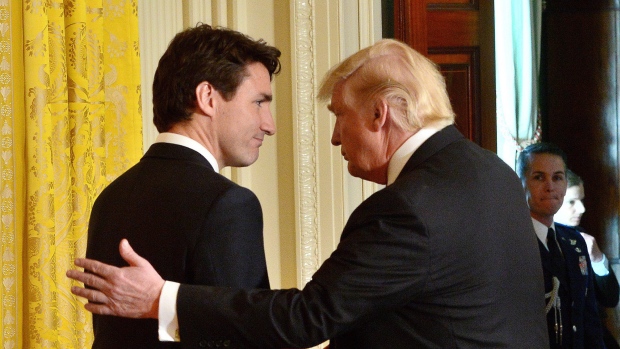Sep 27, 2018
Canada needs assurances U.S. won’t ‘harass’ industries after trade deal reached: Advisor

A new trade deal between Canada and the U.S. is “pretty close” to being made, but Canada needs assurances it won’t face “draconian” measures from the U.S. after the deal is done, according to a NAFTA council member.
Hassan Yusuff, who is also president of the Canadian Labour Congress, told BNN Bloomberg Canada wants to make sure it doesn’t face measures like section 232 of the Trade Expansion Act of 1962 that allowed U.S. President Donald Trump to impose steel and aluminum tariffs on Canadian imports on the grounds of national security.
“We know that the aluminum and steel tariffs will need to be removed at some point, but I think Canada wants some assurances going forward that the president will not continue to use this after we sign an agreement to harass our industry simply because he’s mad at our prime minister or some elements of decisions we have made in Canada to defend our sovereignty,” Hassan said in an interview Thursday.
“The president is fully aware, if he’s been briefed properly by his trade negotiator, that this thing is pretty well close to get done, but they have to make some decisions and it’s up to them to make that decision.”
Hassan said Canada has worked on all of the concerns the Americans had before the renegotiations began – making some compromises – but two critical issues that remain on the table for Canada are the Chapter 19 dispute resolution mechanism and the future use of measures like 232.
“I think what Canada is trying to say is that we can sign an agreement tomorrow, and there’s nothing stopping the president from using 232 to, of course, challenge our trade going to the United States,” Hassan said.
“We’re saying there’s something wrong about how you use this application of 232…Why should we be subjected to such a draconian measure, recognizing that we have never undermined our trading relationship with the United States.”
He added that the negotiators have moved beyond Trump’s issues with Canada’s dairy sector, because Canada has assured the U.S. that can agreement can be reached.
“This is no longer about dairy,” Hassan said. “The president is fully aware that that issue can be resolved in a way that both countries can feel satisfied. We will have a dairy industry, we will continue to have supply management, but at the same time they may have access to our dairy industry in this country.”
But Trump’s comments on Wednesday suggested the two countries were far from reaching a deal. During a press conference in New York, Trump said the U.S. was “very unhappy” with the trade negotiations and he rejected a meeting request from Prime Minister Justin Trudeau this week.
Hassan said he knows that the prime minister’s office did not request a meeting with Trump and his actions are not the way to conduct a relationship with his closest ally.
“I don’t think we should succumb to the threat, and of course the bullying, that the president is trying to impose on our country,” he said.
“This will not do well for us going forward in a new NAFTA agreement.”









